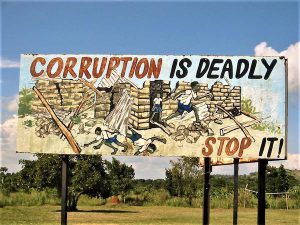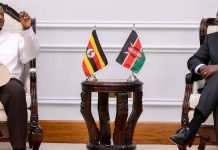Africa-Press – Uganda. The Ugandan government has acknowledged that corruption is one of the main challenges facing the country. But recent developments have raised questions on the government’s political will to address it.
According to Uganda’s Anti Corruption overview, several reforms, laws and new institutions to fight corruption have been established. However, in spite of recent investigations and corruption trials, an effective enforcement of the laws in place is still lacking.
Level of corruption in Uganda
Corruption in Uganda is characterised by grand-scale theft of public funds and petty corruption involving public officials at all levels of society as well as widespread political patronage systems.
Elite corruption in Uganda is through a patronage system which has been exacerbated by foreign aid. Aid has been providing the government with large amounts of resources that contribute to the corrupt practices going on within the country. The style of corruption that is used is to gain loyalty and support so that officials can remain in power.
One of the recent forms of corruption is through public procurement because of the lack of transparency with transactions that happen within the government.
Birth of corruption in Uganda

The culture of giving gifts for something in exchange has always been a feature in Ugandan tradition in the past, this practice was the norm and not taken as illegal. But unfortunately this practice of patronage which has been central to politics in Uganda cannot simply be whipped away over night.
The issue of privatisation of government property is inaccurate in the authoritarian regime as it tends to negatively affect the already strained masses and distributes public wealth to the dictator inner circle.
Foreign aid has also contributed to corruption in Uganda through the large amounts of money and resources that are sent over. Foreign donors attempt to liberalise the Ugandan economy , The world Bank and International Monetary Fund provide assistance to Uganda through Structural adjustment programs. These programs encouraged Uganda to decentralise and privatise. When Uganda began privatisation, they did it in a non-transparent way which allowed government officials to obtain these state-owned assets.
Engineer Fredrick Mubiru Private Engineering Consultant in an interview with “Africa Press” said Uganda’s biggest problem is the scarcity mindset. Many people think they do not have enough although they may actually have.
He added that some people, especially those in employment feel that the next day the opportunity to earn may not be there, so they grab whatever comes in their way.
“Others feel they should work for offsprings, so they grab whatever is possible. I feel that if people are sure of education for their kids, accommodation and health care, the corruption may be decreased,” said Mr Mubiru.
According to a political journalist who preferred to remain anonymous, while giving her opinion to “Africa Press” on whether Uganda will ever over come the burden of corruption said: “It won’t, may be if the government changes because at the moment almost everybody is corrupt especially those in public institutions like lands, water, immigration, Health, education etc,” said anonymous.
High corruption risk institutions

There are several high corruption risk areas, such as police, judiciary and procurement. Risk and compliance portal explained why some sectors such as judiciary, police and others as highly corrupt saying that: There is a high risk of corruption in Uganda’s judicial sector, in part due to political interference.
About one in six companies indicate the court system a major constraint to their ability to do business. Nearly half of Ugandans perceive the judiciary as corrupt and also nearly half of those who have come into contact with the courts in the past twelve months indicate having paid a bribe.
Police was also mentioned, three in four Ugandans perceive the police to be corrupt. over half of firms pay for private security and one in five firms indicate that crime, theft, and disorder are major constraints to their ability to do business.
Government of Uganda’s take on corruption

The newly sworn in President of Uganda Yoweri Kaguta Museveni during his recent inauguration speech on 12 May 2021 vowed to fight corruption of government officials including magistrates and policemen, and dealing decisively with the cattle and those who steal crops from gardens.
According to the recent statement released by Uganda Media Centre, President Museveni announced that is on a war path in his renewed fight against corruption.
President Museveni said corruption was failing the country’s development agenda, warning whoever is involved is going to face his full force.
Museveni previously defended governments’ slow response to corruption cases saying the vice had become complex with educated people in public offices making it almost impossible to pin them without evidence.
Shamiim Mujomba nutritionist during a phone interview with “Africa Press” said the Ugandan government cannot combat corruption because of the less than margin salary or payments given to most of the employees.
“Living standards keep on raising day by day, yet salaries are maintained or even cut, and yet people have to meet their standards of living. Population increments with less resources to cater for them making most people resort to all forms of corruption,” said Ms Mujomba.






